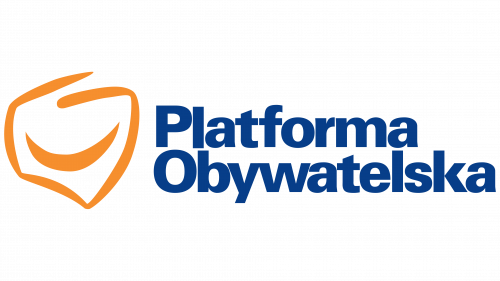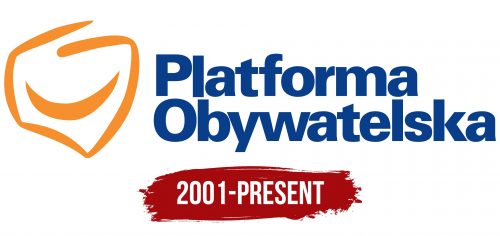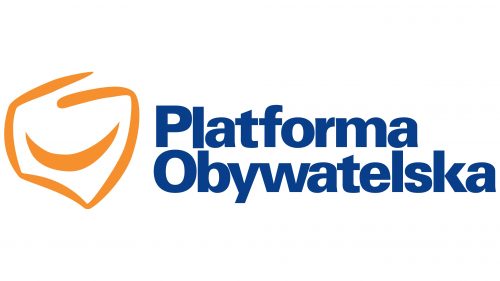 Platforma Obywatelska Logo PNG
Platforma Obywatelska Logo PNG
The Platforma Obywatelska logo is avant-garde and positive. The emblem encodes images that guarantee protection and the defense of citizens’ positions. The logo conveys openness and readiness for dialogue.
Platforma Obywatelska: Brand overview
On January 19, 2001, Platforma Obywatelska (Civic Platform, PO) emerged from a group of politicians who had parted ways with the Freedom Union (Unia Wolności). Andrzej Olechowski, Maciej Płażyński, and Donald Tusk founded the party, which embraced a liberal, pro-European ideology, advocating for a free market and minimal state intervention in the economy.
In its first parliamentary election in 2001, the party secured 12.68% of the vote, gaining 65 seats in the Sejm, making it the third-largest party in parliament. By 2005, the group participated in the presidential elections, nominating Donald Tusk. Lech Kaczyński of the Law and Justice (PiS) party defeated him in the second round.
The organization placed second in the 2005 parliamentary elections with 24.1% of the vote, earning 133 seats in the Sejm. Efforts to form a coalition with PiS did not succeed, and the group stayed in opposition. The political landscape shifted in 2007 after the PiS coalition government dissolved, leading to early elections. The party emerged victorious with 41.51% of the vote, securing 209 seats. Donald Tusk became Prime Minister, forming a coalition with the Polish People’s Party (PSL).
Under Tusk’s leadership, the PO-PSL government implemented economic reforms to liberalize the economy and attract foreign investment. Poland notably avoided recession during the global financial crisis of 2008-2009, a unique achievement among EU countries.
Tragedy struck in 2010 when President Lech Kaczyński died in a plane crash near Smolensk. Bronisław Komorowski from the organization won the presidential election that followed. The party repeated its success in the 2011 parliamentary elections, becoming the first party in post-communist Poland to secure a second consecutive term.
In 2014, Donald Tusk stepped down as Prime Minister to become President of the European Council, and Ewa Kopacz succeeded him, becoming Poland’s second female Prime Minister. The 2015 presidential election saw Bronisław Komorowski lose to Andrzej Duda of PiS, marking the beginning of a challenging period for the group.
The 2015 parliamentary elections resulted in the party obtaining 24.09% of the vote and 138 seats, thus moving to the opposition as PiS formed the government. Following the defeat, Grzegorz Schetyna became the organization’s new leader, aiming to counter PiS policies that the PO perceived as threats to democracy and the rule of law.
In 2019, the group formed the Civic Coalition (KO) with several smaller parties to contest the European and parliamentary elections. The coalition achieved 38.47% of the vote in the European Parliament elections, securing 22 seats. In the 2019 parliamentary elections, the Civic Coalition, led by the group, placed second with 27.40% of the vote and 134 seats. Despite being the strongest opposition force, the organization could not regain power.
Borys Budka replaced Grzegorz Schetyna as the group’s leader in January 2020. Throughout its history, the party evolved from a purely liberal economic platform to a centrist stance, increasingly focusing on social issues and the protection of democratic institutions.
Meaning and History
What is Platforma Obywatelska?
It is a Polish political party based on centrist and center-right ideology principles. The party focuses on liberal economic and social views. It was founded by a group of politicians, including Donald Tusk, and has become one of the leading political forces in the country. The party actively participates in parliamentary elections, representing the interests of its supporters and advocating for reforms in various societal areas. The party’s main priorities are strengthening democracy, supporting entrepreneurship, and integrating Poland into international structures.
2001 – today
The platform unites patriotic individuals with an active approach to life. During the party’s formation and rise in popularity, the logo served as a means of conveying its key values: protecting citizens’ interests, openness, and a positive approach to problem-solving. The party focuses on caring for and protecting its citizens, striving to create an optimistic future for Poland.
The “Platforma Obywatelska” (Civic Platform) logo has a two-level blue inscription and an orange symbol.
The symbol, created with an angular line, carries several meanings:
- Heart: symbolizes love for voters and care for the interests of Poles.
- Shield: emphasizes the protection of residents and the ability to defend their positions.
- Face: represents openness and closeness to voters.
Inside the figure is a smile, indicating the party’s positive attitude. The symbol looks optimistic, demonstrating the organization’s readiness to listen and attract new supporters.
The font is straight and even, with neat letters, highlighting the party’s well-structured and clearly defined program. The two-level blue inscription adds clarity and seriousness to the logo.
The logo’s color scheme consists of warm orange and deep blue. The orange color of the symbol creates a friendly image, while the blue color of the inscription emphasizes stability and reliability.




